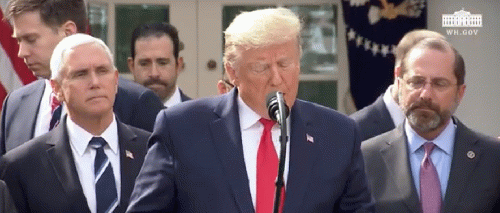From Consortium News

President Donald Trump on March 13, 2020, announcing a state of emergency.
(Image by Video Screenshot) Details DMCA
Now that the Trump administration has declared the COVID19 virus a national emergency, it is plain that this once-a-century catastrophe has some things to tell us about ourselves. A thousand New Age apostles call for unity in 1960s "get together" style. In the Hallmark card category, Marianne Williamson advised us on Twitter Saturday, "We can grow from this."
We may or may not grow from this. This will depend on whether we identify the lessons the COVID19 pandemic has for humanity and then go on to learn from them such that we can effect change in the way we live and organize ourselves. Certain nations agile, imaginative, confident prove capable of change in the face of new circumstances. The U.S. is not one of these, to put the point politely.
The numerous urgings to unite ourselves reek of what the French call ange'lisme hopeless, impotent idealism. These expressions reflect back on us like mirrors, and what they show us is bitter: We preach unity because we have little of it to work with as a nation. Our communities are in one degree or another shredded. The invocation of "we," indeed, is highly questionable.
Three factors leave us in this fragile, more or less helpless state. There is the radical individualism arising from the Anglo-American philosophic tradition. This causes us to neglect and abuse public space with perfect indifference. We are left, in turn, at the mercy of market fundamentalism. "Savage capitalism," as this is known in Latin America, is diabolically merciless, as too many of us know firsthand.
President Donald Trump's press conference Friday, when he announced the state of emergency, was a remarkable occasion, another mirror bearing another lesson. Trump stood shoulder-to-shoulder with a flock of CEOs the White House recruited to counter the spread of COVID19. WalMart will get this done. Google will get this done. Roche, the drug maker, stood in for Big Pharma: They will all help, too. It is a spectacle to watch the powerful speak thus above our heads. Is this what community in America comes to now? Are we to accept that community has been effectively corporatized along with everything else in American life that isn't nailed down (and many things that are)?
Put Trump's appearance Friday next to simultaneous press reports describing the alarming decrepitude of local and state health departments, and the lesson is complete. "Many health departments are suffering from budget and staffing cuts that date to the Great Recession and have never been fully restored," The New York Times observes.
Actually, the story of our starved-out health departments begins in the Reagan era, when the federal government got smaller by shoving various responsibilities onto states and localities without funding these transferred responsibilities. In the face of crisis, we are caught by our own carelessness decades of it as safety nets were ripped up and the commons robbed before our eyes.
It is no better in Britain. On Saturday, Health Minister Matt Hancock disclosed a government plan to force every Briton over 70 years of age into isolation "for a very long time." The figure I read is four months. John Pilger, who released his documentary "The Dirty War on the NHS"a few months ago, asserted on social media over the weekend that this unconscionable proposition is a direct consequence of official neglect of the National Health Service since the Thatcher years (which coincided with the Reagan years, of course).
If there were no chance of growing ourselves out of these dire circumstances, one would not produce documentaries, write columns, or get out of bed in the morning. But we must grasp and address four essential truths if we are to do any of this growing. Syrupy thoughts with no substance behind them are nothing more than distracting salves that effectively disarm us because they invite us to flinch from our actually existing (as the Marxists used to say) conditions.
Role of State
The first of these truths concerns the role of the state. The place of the state in a nation's political economy may well have been the premier question of the 20th Century. Vladimir Lenin had an answer in 1917. John Maynard Keynes had another, more palatable in the Western democracies, a short while later. Jawaharlal Nehru and the Fabians had another, and President Ronald Reagan and Prime Minister Margaret Thatcher another after that. The Clinton and Obama administrations wasted between them 16 years gutlessly playing footsie with the Great Communicator's radical laissez-faire chicanery. It is now chiseled in granite that all must be left to the market. Private sà , public no! To argue otherwise is to belch in chapel.
The West has had the wrong end of the stick on this question since the ReaganThatcher somersault. And here come the ironies. Leaders in the Western capitals scramble as we speak to enact Kenysian stimulus programs and launch state-directed social and economic responses to COVIDÂ 19, Trump's "public-private partnerships," the good old "PPPs," notwithstanding. Let us hope this marks a very sharp turning point. Let us make it mark one.
In truth, the non-West has it all over the old democracies as to the role of the state. This reflects a much stronger idea of community and a properly balanced notion of the individual's place in it. Non-Western nations are unburdened by the Anglo-Â American tradition and have cultures and political histories of their own, even if our Western-centric perspectives leave us ignorant of these. The take-home here: COVID19 puts the West on notice that it needs to reverse course on the place and role of the state and consign the Reaganesque, Thatcherite minimalism to oblivion. Memo to Bill Clinton: You'll never spin "The era of big government is over," your weaselly 1996 utterance, to advantage.
(Note: You can view every article as one long page if you sign up as an Advocate Member, or higher).





